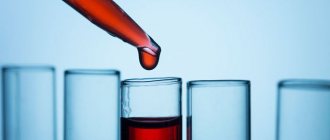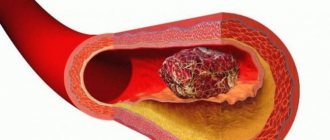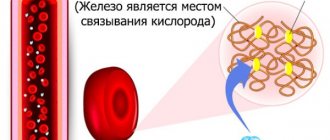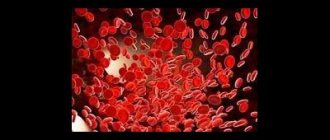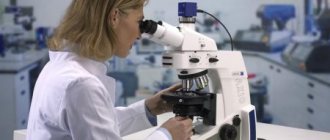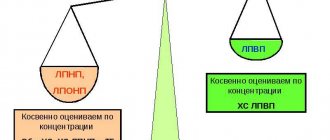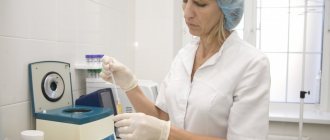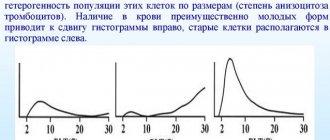Hepatitis
Jaundice
Cervical cancer
Diabetes
50412 03 August
IMPORTANT!
The information in this section cannot be used for self-diagnosis and self-treatment.
In case of pain or other exacerbation of the disease, diagnostic tests should be prescribed only by the attending physician. To make a diagnosis and properly prescribe treatment, you should contact your doctor. We remind you that independent interpretation of the results is unacceptable; the information below is for reference only.
Total protein (in blood) (Protein total): indications for prescription, rules for preparing for the test, interpretation of results and normal indicators.
Indications for prescribing the study
Determining the level of total protein in the blood is recommended as a screening test to look for metabolic disorders of carbohydrates, proteins, fats and microelements, which affects the function of the liver, pancreas, kidneys, etc. A change in the concentration of total protein in the blood may indicate poor nutrition , the presence of acute and chronic inflammatory diseases, oncological processes.
The concentration of total protein may change in the following diseases and conditions:
- emotional stress;
- intense physical activity;
- lack or excess of fluid in the body;
- eating disorders;
- acute and chronic infectious processes;
- prolonged increase in body temperature;
- after operations;
- against the background of extensive burns;
- liver diseases: hepatitis (liver inflammation due to infection with viruses or exposure to toxic substances), cirrhosis;
- chronic autoimmune diseases, as a result of which the immune system attacks the cells of its own body (systemic lupus erythematosus, rheumatoid arthritis, etc.);
- oncological diseases in which abnormal immunoglobulins are produced (proteins with an altered chemical structure, molecular weight or immunological properties).
Normal level of total protein in blood
According to accepted standards and directives of the WHO (World Health Organization), the following indicators (grams per liter) are considered the norm for total protein in the blood:
- newborns – from 45 to 70;
- children under 3 years old – from 51 to 73;
- children under 15 years old - from 60 to 81;
- from 15 years and older – from 65 to 85;
- over 65 years old - from 62 to 81.
Indicators are conditional. Much more important for diagnosis are the indicators of individual proteins, as well as their derivative elements.
Normal values during pregnancy
Low total protein in the blood during pregnancy can provoke the development of many pathologies in the unborn child and therefore requires medication to increase it. It is protein that acts as a “building component”; organs, tissues, neurons, blood, and so on are formed from it.
Accordingly, its deficiency will lead to the fact that the fetus will not be able to fully form. This is especially important in the second and third trimester, when the child’s body is actively gaining weight.
Blood protein levels decrease significantly during pregnancy. This is a normal phenomenon, and indicates that a significant part of it is transported through the placenta to the body of the unborn child.
If for an adult the norm is about 65–85 grams of protein per liter of blood, then during pregnancy this figure drops to 55–65 grams per liter . Accordingly, a decrease in blood protein levels below 55 is considered a deviation from the norm.
Preparation for the procedure
Before studying the concentration of total protein and protein fractions, it is necessary to avoid intense physical activity, drink alcohol, and discuss the use of hormonal medications with your doctor.
No. 28Proteins and amino acids
Total protein (in blood) (Protein total) Synonyms: Total protein of blood serum; Total whey protein. Total Protein; Serum Total Protein; Total Serum Protein; TProt; TR. Brief characteristics of the substance being determined Total protein Blood serum (blood plasma devoid of fibrinogen) contains many proteins that perform various...
Up to 1 business day
315 RUR
Period of execution
analysis – 1 working day.
Complexes with this research
Male check-up No. 1 39 studies for annual preventive examination RUR 18,570 Composition
Blood biochemistry. 13 indicators Optimal biochemical blood test RUR 3,490 Composition
Biochemistry of blood. 19 indicators Advanced biochemical blood test 6,280 R Composition
IN OTHER COMPLEXES
- Healthy interest 4,250 RUR
- Monitoring the diet of a nursing mother RUB 2,940
- Kidney screening RUB 1,270
- Women's check-up No. 1 RUB 19,290
- Vegetarians and vegans RUB 5,820
What may affect the results
Total protein
levels increase with prolonged tourniquet pressure during blood collection.
A decrease in the concentration of total protein and a change in the ratio of protein fractions occurs in the third trimester of pregnancy against the background of an increase in blood volume and its dilution.
You can donate blood to determine the level of total protein (Protein total) at the nearest INVITRO medical office. A list of offices where biomaterial is accepted for laboratory testing is presented in the “Addresses” section.
Interpretation of study results contains information for the attending physician and is not a diagnosis. The information in this section should not be used for self-diagnosis or self-treatment. The doctor makes an accurate diagnosis using both the results of this examination and the necessary information from other sources: medical history, results of other examinations, etc.
Proteins play a huge role in the human body. They are the main structural unit of the cell, perform many functions (mechanical, catalytic, signaling), and transport various substances. Proteins are based on hormones, enzymes that affect the rate of biochemical reactions, and immunoglobulins that protect the body from infections.
Total blood protein is the sum of all protein fractions in the blood.
They maintain colloid-osmotic pressure and thereby a constant blood volume, bind and retain water, preventing it from leaving the bloodstream, participate in ensuring acid-base balance and blood clotting, transport various inorganic and organic substances, bind macro- and microelements, and participate in in immune response reactions, etc.
The starting material for the construction of protein molecules are amino acids, which enter the body with food. The main plasma proteins are synthesized in liver cells, with the exception of immunoglobulins, which are produced in plasma cells (plasmocytes) and lymphocytes.
How to make up for protein deficiency
If protein deficiency was not caused by nutritional factors, then primary attention should be directed to the cause leading to their difficult breakdown and absorption. It is the elimination of this etiological factor that will provide the body with a sufficient amount of proteins - otherwise, everything eaten simply will not be absorbed.
As a rule, the leading role is occupied by hypochlorhydria - a decrease in the secretion of hydrochloric acid by the parietal cells of the stomach. If its cause is a violation of the folate cycle, it is worth starting to work with it, taking a course of active forms of vitamins involved in its mechanisms:
- methylfolate;
- methylcobalamin;
- riboflavin 5-phosphate;
- pyridoxal 5-phosphate.
Provided there is no damage to the gastric mucosa, you can also consider the use of dietary supplements that stimulate the secretion of hydrochloric acid:
- Betaine-pepsin.
- Iodine, chlorine and zinc.
In addition, exposure to stress factors that lead to vasospasm should be reduced or completely eliminated. Increase the tone of the parasympathetic system: as you know, it is the vagus nerve that controls the digestive processes. Take baths with magnesium salts, do relaxing practices like Pilates, yoga, breathing exercises.
Suitable as adaptogens for reducing cortisol levels:
:
- Rhodiola rosea;
- valerian;
- ginseng.
We recommend
“Enzyme deficiency: symptoms and treatment” Read more
Lifestyle changes play a key role in normalizing the condition of the entire body. Move more - let 10,000 steps become not something supernatural for you, but a familiar, everyday norm. Eliminate simple sugars from your diet as much as possible: especially if the cause of impaired secretion of digestive juices lies in the syndrome of excessive fungal or bacterial growth.
Go to bed early: at 11 p.m., the secretion of melatonin, an antioxidant hormone responsible for youth, beauty and actively counteracting the development of oxidative stress, begins. In addition, the release of other, no less important hormones: TSH and somatotropin is also tied to the sleep-wake cycle.
Reference values for total protein
| Age | Women, g/l | Men, g/l |
| 1 day – 4.3 weeks | 42–62 | 41–63 |
| 4.3 weeks – 6 months | 44–66 | 47–67 |
| 6–12 months | 56–79 | 55–70 |
| 12–24 months | 56–75 | 56–75 |
| 24 months – 14 years | 60–80 | 60–80 |
| 14–60 years | 64–83 | 64–83 |
| > 60 years | 62–81 | 62–81 |
Interpretation of results in children and adults
An increase in the concentration of total protein (hyperproteinemia) can be observed:
- against the background of intense physical activity (due to the breakdown of muscle proteins and their release into the blood);
- due to dehydration: due to lack of water intake or loss of a large volume of fluid in diseases and conditions accompanied by uncontrollable vomiting, diarrhea, increased sweating, excessive urination;
- with increased protein synthesis against the background of chronic systemic inflammatory diseases, autoimmune processes, including due to an increase in the amount of antibodies (immunoglobulins), with chronic non-infectious hepatitis (for example, with alcohol intoxication). The reason for the persistent increase in the content of total protein in the blood is malignant diseases (myeloma, macroglobulinemia), in which plasma cells produce pathological (not normally found) proteins similar to immunoglobulins.
A decrease in the concentration of total protein in the blood (hypoproteinemia) is observed when:
- insufficient intake, improper breakdown or impaired absorption of proteins. This occurs against the background of prolonged fasting, unbalanced nutrition, inflammatory diseases of the gastrointestinal tract (enterocolitis - inflammation of the intestines, pancreatitis - inflammation of the pancreas);
- increased consumption or loss of protein (kidney diseases, in which protein enters the urine, protein consumption for the construction of tumor tissue, loss of protein during extensive bleeding);
- chronic diseases (hepatitis, cirrhosis), when the liver loses its ability to synthesize proteins;
- increased breakdown of proteins after operations, against the background of prolonged fever, burns, cancer;
- redistribution and release of protein and fluid from blood vessels during inflammation (with the formation of exudate) and during non-inflammatory processes (with the formation of transudate);
- congenital deficiency of immunoglobulins.
If the indicator deviates from the norm, the following studies are additionally carried out: albumin (in the blood) (Albumin), protein fractions (Serum Protein Electrophoresis, SPE), clinical blood test: general analysis, leukoformula, ESR (with mandatory “manual” microscopy of a blood smear).
Symptoms of protein deficiency in the body
One of the most striking manifestations of insufficient intake and/or absorption of proteins is the appearance of edema. Their development is associated with a naturally occurring failure of water-salt metabolism: under conditions of reduced concentration of proteins in the blood plasma, which normally retain water, the latter passes into the tissues, which is accompanied by their subsequent swelling.
In addition, given the huge role of proteins in creating the skeleton, framework of all cells and organs, their deficiency leads to disruption of tissue structure: brittle hair and nails are noted, and the quality of the skin deteriorates.
Along with the plastic function, this class of organic compounds also performs a catalytic one. A decrease in peptide content leads to a decrease in enzyme activity. In essence, this is a real transport collapse on the highways of metabolism: it slows down and becomes sluggish.
A wide range of hormones also have a protein nature - the endocrine system begins to suffer no less than everyone else. Characteristic: absence of menstruation, decreased production of thyroid hormones (which adds fuel to the already weak fire of barely occurring metabolic processes), slowdown in growth and development due to inhibition of the pituitary gland's synthesis of tropic hormones - including somatotropin.
The lack of amino acids causes proteolysis of tissue proteins - there is a decrease in muscle mass, its tone and strength.
In other words, there is no organ that is not affected by protein deficiency - total dysfunction progresses at all levels of functioning: from molecular to organismal.
